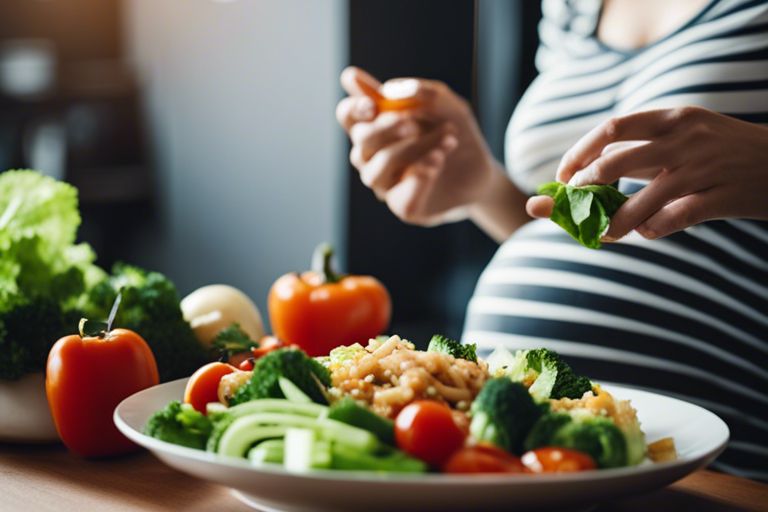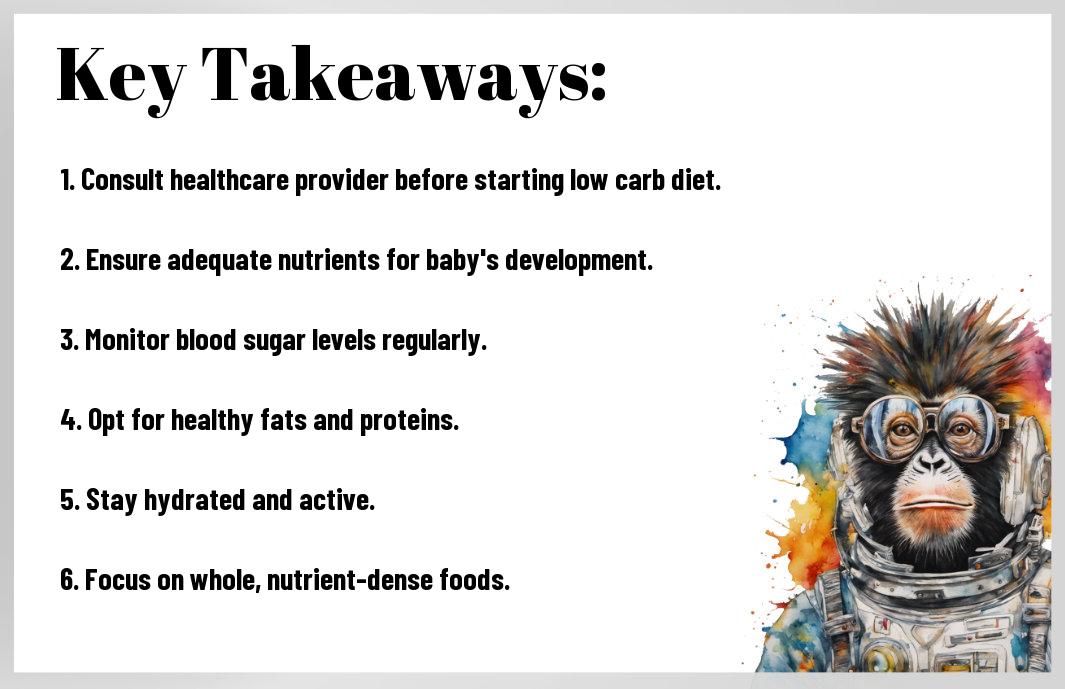Embarking on the incredible journey of pregnancy brings many questions. Your health and your baby’s health are top priorities. One crucial aspect to consider is your diet. You might wonder if a low-carb diet is safe and effective during this period. With proper guidance, a well-structured low-carb diet can help manage your weight, blood sugar levels, and overall well-being. This article explores the benefits and guidelines of low-carb diets specifically for pregnant women.

Benefits of Low Carb Diets for Pregnant Women
Your body undergoes numerous changes during pregnancy, and a low-carb diet can have a significant impact on your overall health and well-being. By adopting a low-carb diet plan, you can experience several benefits that will make your pregnancy journey smoother and healthier.
Weight Management
Any excessive weight gain during pregnancy can lead to complications, but a low-carb diet helps you maintain a healthy weight. By reducing your carb intake, you’ll feel fuller for longer, reducing the likelihood of overeating and promoting a steady weight gain.
Blood Sugar Control
Benefits of a low-carb diet extend to blood sugar control, which is crucial during pregnancy. By limiting your carb consumption, you’ll experience a decrease in blood sugar levels, reducing the risk of insulin resistance and related complications.
Blood sugar control is critical during pregnancy, as high blood sugar levels can lead to an increased risk of gestational diabetes, preeclampsia, and other complications. A low-carb diet helps regulate blood sugar levels, ensuring a healthier pregnancy.
Reduced Risk of Gestational Diabetes
Control your carb intake, and you’ll significantly reduce the risk of gestational diabetes. This condition can lead to serious health complications, but a low-carb diet helps maintain healthy blood sugar levels, minimizing the risk of gestational diabetes.
Sugar cravings are common during pregnancy, but a low-carb diet helps you manage these cravings, reducing the risk of gestational diabetes. By choosing a low-carb diet plan, you’ll make healthier food choices, promoting a healthier pregnancy and reducing the risk of gestational diabetes.

Safe Carb Intake for Pregnant Women
If you’re expecting, it’s imperative to understand the importance of carbohydrate intake during pregnancy. While it’s crucial to limit your carb consumption, you still need to fuel your body and support your baby’s growth.
Daily Carb Allowance
Pregnant women require a balanced diet that includes a moderate amount of carbohydrates. Your daily carb allowance depends on various factors, such as your weight, height, and activity level. A general guideline is to consume 175-225 grams of complex carbohydrates per day. This will provide your body with the necessary energy while keeping your blood sugar levels in check.
Choosing Complex Carbohydrates
An excellent way to ensure you’re getting the right type of carbs is to focus on whole, unprocessed foods. Include foods like whole grains, fruits, vegetables, and legumes in your diet. These complex carbohydrates are rich in fiber, vitamins, and minerals, making them an ideal choice for pregnant women.
Understanding the benefits of complex carbohydrates is crucial during pregnancy. These foods are digested slowly, preventing sudden spikes in blood sugar levels. This helps regulate your insulin levels, reducing the risk of gestational diabetes and other complications.
Avoiding Refined Carbs
Intake of refined carbohydrates should be limited or avoided altogether during pregnancy. Refined carbs, such as white bread, sugary snacks, and sweetened beverages, can cause a rapid increase in blood sugar levels. This can lead to insulin resistance, putting you at risk for gestational diabetes and other health problems.
Carbs from refined sources are imperatively empty calories, providing no nutritional value to your body. By avoiding these foods, you’ll not only manage your carb intake but also reduce your risk of pregnancy-related complications. Instead, opt for whole, nutrient-dense foods that will support your overall health and well-being.
Essential Nutrients for a Healthy Pregnancy
To ensure a healthy pregnancy, it’s crucial to focus on consuming important nutrients that support your baby’s growth and development. According to WebMD, “Creating a Pregnancy Diet: Healthy Eating During Pregnancy” is critical for a healthy pregnancy. As you navigate your low-carb diet plan, make sure to prioritize the following important nutrients.
Protein-Rich Foods
One of the most critical nutrients for fetal development is protein. You should aim to consume protein-rich foods like lean meats, fish, eggs, dairy products, and legumes. These foods provide the necessary building blocks for your baby’s growth and development.
Healthy Fats for Fetal Development
Healthy fats are important for your baby’s brain and nervous system development. You should include sources of healthy fats like avocados, nuts, and olive oil in your diet.
Healthy fats also play a crucial role in hormone production and can help regulate your blood sugar levels. As you follow your low-carb diet plan, make sure to include a balance of healthy fats to support your overall health and your baby’s development.
Crucial Vitamins and Minerals
Healthy pregnancies require a range of vitamins and minerals, including folic acid, iron, and calcium. You should focus on consuming foods rich in these nutrients, such as dark leafy greens, lean meats, and dairy products.
Vitamins and minerals play a vital role in your baby’s development, from forming their bones and teeth to supporting their immune system. As you plan your meals, make sure to include a variety of foods that provide these important nutrients. By prioritizing these nutrients, you can support a healthy pregnancy and give your baby the best possible start in life.
Low Carb Food Options for Pregnant Women
Not all low-carb diets are created equal, especially when it comes to pregnancy. As a pregnant woman, you need to make sure you’re getting the right nutrients for your growing baby while still managing your carb intake. Here are some healthy and delicious low-carb food options to add to your diet:
Vegetables and Fruits
Apart from leafy greens like spinach and kale, you can also enjoy low-carb veggies like broccoli, cauliflower, and avocado. Berries, citrus fruits, and apples are great fruit options that are low in carbs and rich in fiber and antioxidants.
Lean Protein Sources
For a healthy pregnancy, you need protein-rich foods that are low in carbs. Opt for lean meats like chicken, turkey, and fish, as well as eggs, tofu, and legumes.
For instance, a 3-ounce serving of grilled chicken breast contains only 0g of carbs and 26g of protein. You can also try Greek yogurt, cottage cheese, and ricotta cheese as excellent sources of protein and calcium.
Healthy Snacks and Beverages
Pregnant women often experience cravings and hunger pangs, but it’s crucial to choose snacks that are low in carbs and rich in nutrients. Reach for nuts, seeds, and veggies with hummus or guacamole, and drink plenty of water, seltzer, and unsweetened tea.
Fruits like berries and citrus fruits make great snacks, and you can also try low-carb granola made with nuts and seeds. Remember to always check the nutrition label to ensure the ingredients and carb count align with your dietary needs.
Sample Meal Plans for Low Carb Pregnancy Diets
Now that you have a better understanding of what to eat and what to avoid on a low-carb diet during pregnancy, it’s time to explore some sample meal plans to help you get started.
Breakfast Ideas
Carb-conscious breakfast options can be just as delicious as they are healthy. Try pairing scrambled eggs with spinach and avocado, or enjoy a bowl of Greek yogurt with berries and chopped nuts. You can also whip up a low-carb smoothie with protein powder, almond milk, and frozen berries.
Lunch and Dinner Options
Diets rich in protein and healthy fats are imperative for a low-carb pregnancy diet. Opt for grilled meats, fish, and poultry, and pair them with roasted vegetables like broccoli, cauliflower, and Brussels sprouts. Don’t forget to include healthy fats like olive oil, avocado, and nuts in your meals.
Ideas for lunch and dinner can include grilled chicken breast with a side of cauliflower rice, baked salmon with a serving of green beans, or a hearty beef stir-fry with vegetables like bell peppers and mushrooms. Remember to always choose whole, unprocessed foods whenever possible.
Snack and Dessert Recipes
Sample low-carb snack options include celery sticks with almond butter, hard-boiled eggs, and mozzarella cheese. For dessert, try making low-carb treats like protein-rich cheesecake or sugar-free chocolate mousse.
A key to success on a low-carb diet during pregnancy is to plan ahead and have healthy snacks on hand. This will help you avoid temptation and ensure you’re getting the nutrients you need. Experiment with different recipes and find what works best for you and your taste buds.
Common Concerns and Myths about Low Carb Diets during Pregnancy
Keep in mind that a low-carb diet during pregnancy can be safe and beneficial when done correctly. However, there are some common concerns and myths that you may encounter.
Dealing with Morning Sickness
Morning sickness can be a major challenge during pregnancy, and you may worry that a low-carb diet will exacerbate the issue. Fortunately, many women find that a low-carb diet helps alleviate morning sickness symptoms by stabilizing blood sugar levels and reducing inflammation.
Managing Cravings and Hunger
Pregnancy cravings can be intense, and you may worry that a low-carb diet will leave you feeling hungry and deprived. However, with a little planning and creativity, you can satisfy your cravings while staying within your daily carb limit.
To manage cravings and hunger, focus on incorporating protein-rich foods, healthy fats, and fiber-rich vegetables into your meals. This will help keep you full and satisfied between meals. Additionally, consider meal prepping and snacking on low-carb friendly foods like nuts, seeds, and veggies to curb cravings.
Addressing Concerns about Nutrient Deficiencies
Cravings for unhealthy foods can be a sign of underlying nutrient deficiencies, and you may worry that a low-carb diet will lead to deficiencies in vital vitamins and minerals. However, a well-planned low-carb diet can provide all the necessary nutrients for a healthy pregnancy.
Common nutrient deficiencies during pregnancy include iron, calcium, and omega-3 fatty acids. To ensure you’re getting enough of these vital nutrients, focus on incorporating iron-rich foods like red meat and spinach, calcium-rich foods like dairy and leafy greens, and omega-3 rich foods like fatty fish and walnuts into your diet. Additionally, consider consulting with a healthcare professional or registered dietitian to ensure you’re getting all the necessary nutrients for a healthy pregnancy.
Final Words
Considering all points, you now have a comprehensive understanding of low carb diet plans tailored specifically for pregnant women like you. Be mindful of, it’s necessary to consult your healthcare provider before making any significant changes to your diet. By following a well-structured low carb diet plan, you can ensure a healthy pregnancy while minimizing the risk of gestational diabetes and other complications. Take control of your health, and make informed choices to give your baby the best possible start in life.


very nice blog i was looking for something that would help my wife.Low Carb Diets for Pregnant Women was somthing she has been talking about so i started doing my reaserch to see if we could find any good info then i found this page and its turly amazing thanks for shareing and the help
Thank you so much for your kind words, Shawn! I’m thrilled to hear that you found the information helpful for your wife. Low Carb Diets for Pregnant Women can be a great topic to explore, and I’m glad my blog could provide some valuable insights. If you have any more questions or need further information, feel free to ask. Thanks again for your support! #LowCarbPregnancy #HealthyEating #NutritionForMoms #PregnancyDiet #HealthyLifestyle
Jerry